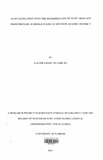| dc.description.abstract | The main purpose of the study was to investigate the determinants of pupil drop out hom primary schools in Kikuyu Dix ision, Kiambu District. The study also sought to determine the effects of school drop out at primary school level. Finally the study also aimed at identifying strategies which can be employed in curbing the drop out problem. The justification of the study was based on the evidence of dropouts from primary schools in the division where enrolment figures reduce as pupils progress upwards. This has not only caused concern from the policy makers and educational administrators but also from the rest ofthe stakeholders
The literature reviewed fell under various sub-topics including; the origin and development of primary education in Kenya, a general overview of determinants of school drop out and categorized determinants of school drop out. The study design used was ex-post facto. The target population was the 53 public primary schools in Kikuyu Division where the year 2003 standard eight pupils and the class eight teachers participated in the study. Simple random sampling was used to obtain 30 schools and the same procedure was used to select 300 pupils and 40 teachers. Two sets of questionnaires were used as research instruments to collect data from the teachers and pupils. The questionnaires had both closed and open -ended items.
Before the main study, a pre-test was carried out in three schools randomly selected from tlie 30 schools to test the validity and reliability of the instruments. The return rate of the
questionnaires was 91.7%. Research questions were used to obtain the required information for the study. The data was mainly analysed using descriptive statistics.
It was found that in the Division the drop out rate for boys is higher than that of the girls. Among the main determinants highlighted for pupil drop out were: poverty, family problems, lack of parental concern, lack of interest, peer pressure and influence and repetition and poor academic performance. Others were truancy, pregnancy and early marnages, need to work and supplement the family's income, health problems among others.
The teachers and pupils indicated the effects of school drop out as: increase of social evils and crime, low literacy rates, increase of pox erty, dependency, curtailing future prospects of the dropouts, lack of suitable employment among others. Guidance and Counselling emerged as the most effective means of curbing the dropout problem as indicated by the teachers' and pupils' responses. The teachers also suggested the teachers' support on the government's move of providing free and compulsory primary education, provision of learning materials and facilities, training of teachers for guidance and counselling programme, establishing a warm and healthy relationship between the teachers and the pupils, offering of quality education, prov ision of basic necessities by the parents,
monitoring students' academic progress and portraying a positive attitude towards
education as a means of alleviating the drop out problem. The community role suggested was in supporting and steering campaigns on importance of education and providing with the available resources and facilities.
From the study it was recommended that the government should embark on sensitization seminars, programmes, courses and fora on HI V / AI DS scourge among the teachers, pupils, parents and community members as a way of curbing its spread; more practical measures of alleviating poverty from grassroots should be introduced to empower the people economically, the government should employ more teachers so as to cope with the challenges of implementing free and compulsory primary education and make it a reality to avoid compromising the quality of education for numbers, parents who do not take their children to school or withdraw them for other activities, should be sued in a court of law.
The following areas were suggested for further research:-
• An evaluation study be done to determine the impact of free and compulsory primary education on drop out, completion and retention rates.
• A similar study covering a wider sample of primary schools in the country be carried out.
• A study on activities that boys engage in after dropping out of school from primary schools in Kikuyu Division be carried out with boys dropouts as the sample.
• A comparative study on occupational opportunities between school completers and dropouts be carried out. | en |

